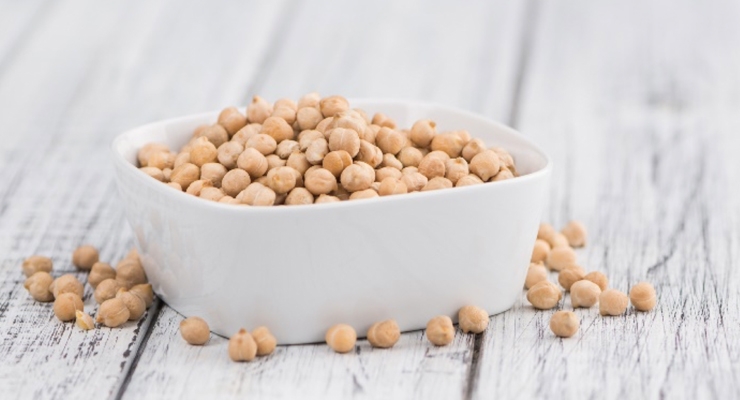07.12.18
Booth S1826
Nutriati, Inc. (Richmond, VA) and exclusive commercialization partner PLT Health Solutions, Inc. (Morristown, NJ) are introducing a premium quality chickpea protein solution to North American food, beverage, and supplements markets.
Called Artesa Chickpea Protein, the new ingredient is the first chickpea-based protein concentrate available in commercial quantities, according to the companies. Nutriati re-engineered the manufacturing process for Artesa to address some of the main issues related to formulating with plant proteins—starting with ingredient taste and overall in-product sensory experience.
Consumer testing has shown that Artesa can approach the sensory and formulating experience of dairy proteins in the areas of taste, texture, product structure, and mouthfeel. The very small, uniform particle size of Artesa Chickpea Protein is responsible for formulating benefits that include enhanced dissolution and suspendability, excellent foaming and emulsifying properties and faster, easier processing with less waste than occurs with other leading plant proteins. Both companies feel that food and beverage markets, which have seen dramatic increases in chickpea-based foods and snacks over the last few years, will take advantage of consumer fondness for the sustainable, healthy pulse ingredient in their protein-fortified products.
According to Richard Kelly, CEO and co-founder of Nutriati, Inc. the company’s selection of the chickpea as the source for its plant protein offering is based on a range of factors—from taste and processability to its high sustainability. “The chickpea gets excellent marks when it comes to sustainability. Chickpeas require significantly lower use of chemical fertilizers, water and pesticides in production. They also have the lowest carbon footprint of any protein starting materials and contribute to healthier soils,” he said. “Hummus introduced mainstream America to the chickpea as a food two decades ago, and consumers haven’t looked back. Forty percent of all chickpea-based food product introductions over the last 15 years occurred in 2016 and 2017 and 2016 saw a 150% increase in chickpea-based snack introductions. We think chickpeas are a great ingredient for the future of food,” he said.
Addressing Sensory & Processing Issues
Artesa Chickpea Protein is manufactured in the U.S., with chickpeas drawn from select farms in the U.S and Canada. Nutriati’s production process is protected by intellectual property and differs significantly from traditional plant protein processes that rely on high amounts of water, acids and precipitation. The Artesa Chickpea Protein concentrate has a minimum protein content of 60%, and a fiber content of 14%.
One distinguishing feature of Artesa Chickpea Protein concentrate is a very small and highly uniform particle size that allows it to function like dairy proteins in food, supplement and beverage applications. In beverages, this small particle size enhances dissolution and suspension of the ingredient in liquids and reduces sedimentation that is a common issue for plant proteins—particularly in higher pH beverages where “crash out” can occur. In low moisture applications like bakery, the small particle size reduces viscosity of formulations which can help prevent production bottlenecks and reduce non-spec products and waste.
Artesa Chickpea Protein also has high water binding capacity and foaming and emulsification properties that other plant proteins don’t, which can be critical to processing efficiency, shelf-life, and final product quality.
Gold Standard Product Development
Nutriati supports the development of new food & beverage products based on Artesa ingredients from its Applications Technical Center in Richmond, VA. According to Nutriati Co-Founder and Chief Innovation Officer Michael Spinelli, Artesa Chickpea Protein was developed to solve production issues that have accompanied attempts to increase the amount of plant protein in foods and beverages. “Among food and beverage producers, stories of struggles with plant protein are pretty common. Taste issues are often solved via the use of masking agents or added sweeteners. Sometimes processing aids or even facility retrofits are required to handle high protein and gluten-free products,” he said. “We have found that recipes featuring Artesa Chickpea Protein can meet or even surpass gold standard formulations for taste, texture and other sensory aspects in a range of product applications. We have also found that people can up the boundaries of protein delivered per serving over anything that has been possible with plant-based ingredients with Artesa and still meet consumer expectations for organoleptics,” he added.
According to Devin Stagg, COO of PLT, the response from food, beverage and supplement companies who have previewed Artesa Chickpea Protein has been positive. “In the short time we have been talking with consumer products companies about Artesa Chickpea Protein, the breadth of different applications for which it is being considered is notable—including several bakery products, plant-based snacks, meal replacement, protein powder, shakes and juice drinks,” he said. “In some of these products, producers are pairing Artesa Chickpea Protein with Artesa Chickpea Flour to enhance nutrition and improve sensory all while reducing the number of ingredients for leaner, cleaner labels. We’re excited about the opportunity to meet with an even wider range of companies to work with them on producing healthier, great tasting products.”
Nutriati, Inc. (Richmond, VA) and exclusive commercialization partner PLT Health Solutions, Inc. (Morristown, NJ) are introducing a premium quality chickpea protein solution to North American food, beverage, and supplements markets.
Called Artesa Chickpea Protein, the new ingredient is the first chickpea-based protein concentrate available in commercial quantities, according to the companies. Nutriati re-engineered the manufacturing process for Artesa to address some of the main issues related to formulating with plant proteins—starting with ingredient taste and overall in-product sensory experience.
Consumer testing has shown that Artesa can approach the sensory and formulating experience of dairy proteins in the areas of taste, texture, product structure, and mouthfeel. The very small, uniform particle size of Artesa Chickpea Protein is responsible for formulating benefits that include enhanced dissolution and suspendability, excellent foaming and emulsifying properties and faster, easier processing with less waste than occurs with other leading plant proteins. Both companies feel that food and beverage markets, which have seen dramatic increases in chickpea-based foods and snacks over the last few years, will take advantage of consumer fondness for the sustainable, healthy pulse ingredient in their protein-fortified products.
According to Richard Kelly, CEO and co-founder of Nutriati, Inc. the company’s selection of the chickpea as the source for its plant protein offering is based on a range of factors—from taste and processability to its high sustainability. “The chickpea gets excellent marks when it comes to sustainability. Chickpeas require significantly lower use of chemical fertilizers, water and pesticides in production. They also have the lowest carbon footprint of any protein starting materials and contribute to healthier soils,” he said. “Hummus introduced mainstream America to the chickpea as a food two decades ago, and consumers haven’t looked back. Forty percent of all chickpea-based food product introductions over the last 15 years occurred in 2016 and 2017 and 2016 saw a 150% increase in chickpea-based snack introductions. We think chickpeas are a great ingredient for the future of food,” he said.
Addressing Sensory & Processing Issues
Artesa Chickpea Protein is manufactured in the U.S., with chickpeas drawn from select farms in the U.S and Canada. Nutriati’s production process is protected by intellectual property and differs significantly from traditional plant protein processes that rely on high amounts of water, acids and precipitation. The Artesa Chickpea Protein concentrate has a minimum protein content of 60%, and a fiber content of 14%.
One distinguishing feature of Artesa Chickpea Protein concentrate is a very small and highly uniform particle size that allows it to function like dairy proteins in food, supplement and beverage applications. In beverages, this small particle size enhances dissolution and suspension of the ingredient in liquids and reduces sedimentation that is a common issue for plant proteins—particularly in higher pH beverages where “crash out” can occur. In low moisture applications like bakery, the small particle size reduces viscosity of formulations which can help prevent production bottlenecks and reduce non-spec products and waste.
Artesa Chickpea Protein also has high water binding capacity and foaming and emulsification properties that other plant proteins don’t, which can be critical to processing efficiency, shelf-life, and final product quality.
Gold Standard Product Development
Nutriati supports the development of new food & beverage products based on Artesa ingredients from its Applications Technical Center in Richmond, VA. According to Nutriati Co-Founder and Chief Innovation Officer Michael Spinelli, Artesa Chickpea Protein was developed to solve production issues that have accompanied attempts to increase the amount of plant protein in foods and beverages. “Among food and beverage producers, stories of struggles with plant protein are pretty common. Taste issues are often solved via the use of masking agents or added sweeteners. Sometimes processing aids or even facility retrofits are required to handle high protein and gluten-free products,” he said. “We have found that recipes featuring Artesa Chickpea Protein can meet or even surpass gold standard formulations for taste, texture and other sensory aspects in a range of product applications. We have also found that people can up the boundaries of protein delivered per serving over anything that has been possible with plant-based ingredients with Artesa and still meet consumer expectations for organoleptics,” he added.
According to Devin Stagg, COO of PLT, the response from food, beverage and supplement companies who have previewed Artesa Chickpea Protein has been positive. “In the short time we have been talking with consumer products companies about Artesa Chickpea Protein, the breadth of different applications for which it is being considered is notable—including several bakery products, plant-based snacks, meal replacement, protein powder, shakes and juice drinks,” he said. “In some of these products, producers are pairing Artesa Chickpea Protein with Artesa Chickpea Flour to enhance nutrition and improve sensory all while reducing the number of ingredients for leaner, cleaner labels. We’re excited about the opportunity to meet with an even wider range of companies to work with them on producing healthier, great tasting products.”
















